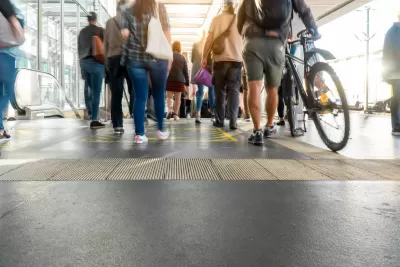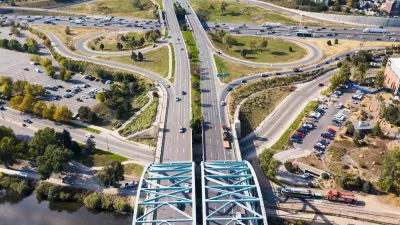California and Kentucky bookend a recent ranking of how well states are using federal infrastructure money to address climate change and racial inequities in their transportation networks.

Following the passage of the Inflation Reduction Act in 2022 and the Bipartisan Infrastructure Law in 2021, historic amounts of federal funding are going to states to invest in infrastructure projects, including transportation. The Biden administration has promoted the use of those funds to address environmental and equity concerns. However, most decisions about how the money is spent fall to state officials, writes Daniel Vock, senior reporter for Route Fifty.
To shine a light on how that’s panning out, the Natural Resources Defense Council (NRDC) recently analyzed and ranked the 50 U.S. states according to how well they are directing money from the infrastructure law to improve equity and climate outcomes in their transportation networks.
“A lot of what you read is the amount of money that is being spent, and that’s seen as a good thing in and of itself. But we would argue that what's more important than the amount of money is literally what is being built on the ground and who that is serving,” John Bailey, an NRDC advocate and one of the primary authors of the report, told Route Fifty.
“Researchers based their rankings on 19 separate factors, including the greenhouse gas impact of road projects, the deployment of electric vehicle chargers, efforts to encourage residents to avoid car trips, and procurement policies that promote women- and minority-owned businesses,” reports Vock.
According to NRDC’s report, the 10 states doing the most and the 10 states doing the least to improve equity and climate outcomes in their transportation networks are as follows:
10 states doing the most
- California
- Massachusetts
- Vermont
- Oregon
- Washington
- New York
- Colorado
- New Jersey
- Connecticut
- Minnesota
10 states doing the least
- Kentucky
- Louisiana
- Nebraska
- Alabama
- South Carolina
- Arizona
- Idaho
- Alaska
- Montana
- Mississippi
Full rankings for all fifty states as well as details on analysis are available in NRDC’s full report.
FULL STORY: The best and worst states for green, equitable transportation

Alabama: Trump Terminates Settlements for Black Communities Harmed By Raw Sewage
Trump deemed the landmark civil rights agreement “illegal DEI and environmental justice policy.”

Planetizen Federal Action Tracker
A weekly monitor of how Trump’s orders and actions are impacting planners and planning in America.

The 120 Year Old Tiny Home Villages That Sheltered San Francisco’s Earthquake Refugees
More than a century ago, San Francisco mobilized to house thousands of residents displaced by the 1906 earthquake. Could their strategy offer a model for the present?

In Both Crashes and Crime, Public Transportation is Far Safer than Driving
Contrary to popular assumptions, public transportation has far lower crash and crime rates than automobile travel. For safer communities, improve and encourage transit travel.

Report: Zoning Reforms Should Complement Nashville’s Ambitious Transit Plan
Without reform, restrictive zoning codes will limit the impact of the city’s planned transit expansion and could exclude some of the residents who depend on transit the most.

Judge Orders Release of Frozen IRA, IIJA Funding
The decision is a victory for environmental groups who charged that freezing funds for critical infrastructure and disaster response programs caused “real and irreparable harm” to communities.
Urban Design for Planners 1: Software Tools
This six-course series explores essential urban design concepts using open source software and equips planners with the tools they need to participate fully in the urban design process.
Planning for Universal Design
Learn the tools for implementing Universal Design in planning regulations.
Clanton & Associates, Inc.
Jessamine County Fiscal Court
Institute for Housing and Urban Development Studies (IHS)
City of Grandview
Harvard GSD Executive Education
Toledo-Lucas County Plan Commissions
Salt Lake City
NYU Wagner Graduate School of Public Service





























